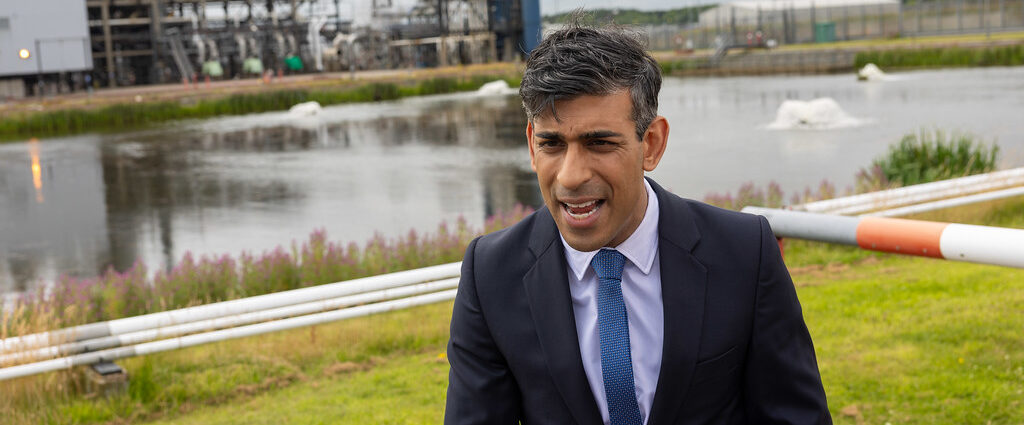Alice Baldan
Environmental groups have written to Rishi Sunak, criticising the UK government’s “watering down” of environmental commitments, following weeks of extreme weather worldwide.
What has PM Rishi Sunak announced?
Prime Minister Rishi Sunak recently approved new oil and gas drilling licences for the North Sea.
Sunak claimed that the licenses are consistent with climate commitments to net zero because using domestic oil and gas would be better for the environment than importing it from other countries. He also said that domestic oil and gas would reduce reliance on hostile states.
https://twitter.com/RishiSunak/status/1686679139858763776
Sunak has faced criticism over his environmental policies in recent weeks. Lord Goldsmith resigned from the government in June, in part due to Sunak’s climate “apathy.” Goldsmith shared his disappointment that the government has abandoned its pledge to spend £11.6 billion on climate change.
The prime minister has also faced criticism due to his frequent use of domestic flights.
What is the response from climate activists?
More than 50 UK environmental groups sent a letter to Sunak expressing “deep alarm” at the government’s backsliding of green policies. Signatories of the letter include WWF UK, Green Alliance, Water Aid UK and Client Earth.
The activists denounced the government’s failure to acknowledge the severity of the climate situation. They accused politicians of using the environment as a “political football” in their campaigns.
This comes after last week’s Conservative win of the Uxbridge and South Ruislip seat in the UK by-election. The Conservative victory has been largely attributed to their opposition to London’s Ultra Low Emission Zone (ULEZ) scheme.
Downing Street has since confirmed that the government would “continually examine and scrutinise” green measures promised in the previous elections, sparking outrage amongst activists. In response, Greenpeace activists climbed to the roof of the prime minister’s mansion and draped it in oil-coloured fabric.
https://twitter.com/GreenpeaceUK/status/1687002798175420416?s=20
Which climate policies could be scrapped?
Since 2020, various green policies have been introduced by the Conservative government. Conservative MP, Jacob Rees Mogg has said that “getting rid of unpopular, expensive green policies” created a political opportunity.
The first and overarching promise was the net zero plan, with the goal of reducing greenhouse gas emissions by 100 per cent from 1990 levels by 2050.
While Sunak had previously pledged to meet the net zero target, the Climate Change Committee reported that progress is “worrying slow” and its confidence in the government’s delivery of emissions reductions from 2030 onwards is “markedly less” than it was a year ago.
"This is a dark day for life on Earth."
Prime Minister Rishi Sunak's assertion that we are "on track" to meet our net zero target by 2050 is "a lie", says conservationist @ChrisGPackham.
Latest climate news: https://t.co/1b1s2io0XZ pic.twitter.com/8rsdjDKnCU
— Sky News (@SkyNews) July 31, 2023
Another commitment aimed to help reach the net zero target was to increase energy efficiency in all privately rented homes by 2028. While it could be costly for landlords, it would lower energy bills for renters. Despite this, Housing Secretary Michael Gove said he would like to see the government “relax the pace” of the 2028 deadline.
Sadiq Khan’s ULEZ scheme is also “under review.” Covering central London, the £12 billion scheme penalises high-polluting vehicles with a £12.50 daily charge.
The government’s plan to fine car manufacturers if 22 per cent of their cars aren’t electric by 2024 is also facing pushback from Business Secretary Kemi Badenoch. On current rules, a company would be fined £15,000 for every vehicle that does not comply.
“The era of global boiling”
Recent months have seen weather catastrophes worldwide, including the Arctic ice sheets melting at record-level rates, global wildfires, flash flooding in India, and extreme heat waves in the Mediterranean. Following the hottest July on record, United Nations Secretary-General, António Guterres, stated that we are in “the era of global boiling.”
The Climate Action Tracker has rated the UK’s progress as “almost sufficient,” but not in line with the Paris Agreement. While the UK has ambitious targets, supported by credible policies, they suggested the UK’s policy gaps include insufficient funding and policies to increase energy efficiency in homes, reduce demand for polluting goods, and decrease fossil fuel supply.
READ NEXT:
-
AT WAR WITH WILDFIRES: THE CLIMATE IN GREECE
-
BRITAIN CELEBRATES 75 YEARS OF THE NHS
-
EMPOWORD EXPLAINS: UK BY-ELECTION RESULTS
Featured image courtesy of Number 10 via Flickr. No changes were made to this image. Image licence found here.

